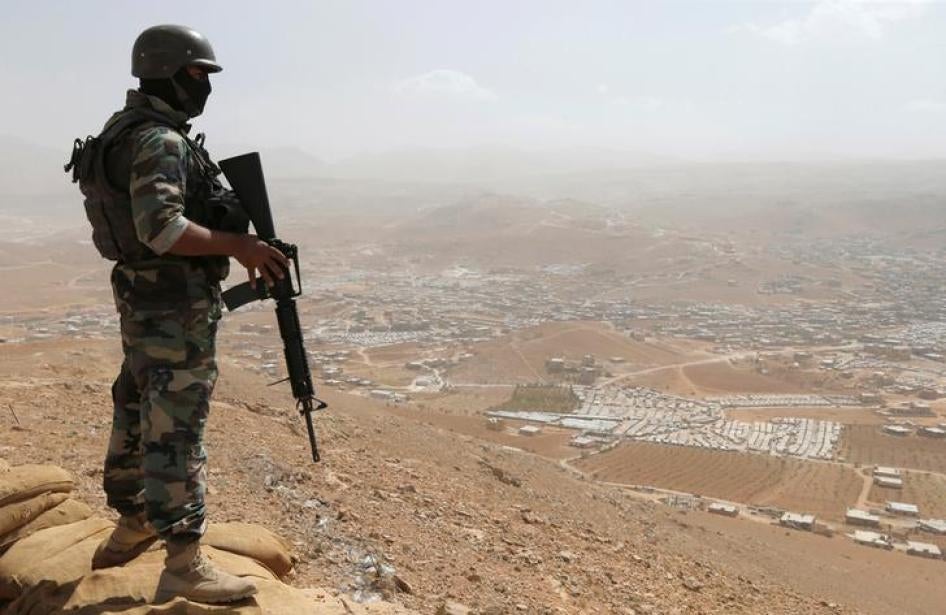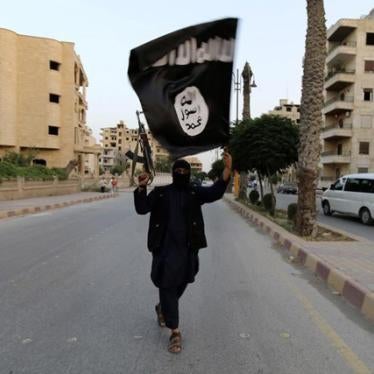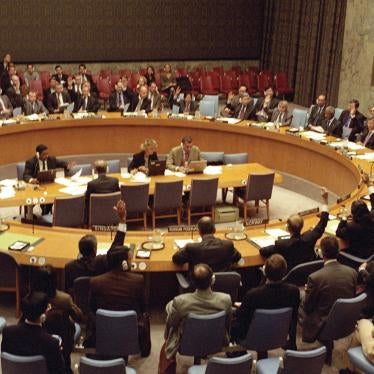(New York) – The United States should ensure no foreign Islamic State (also known as ISIS) suspects held by local allies in Syria are transferred to a country where they are at risk of torture or unfair trials, Human Rights Watch said today.
The US handed over eight Lebanese detainees from northern Syria to Lebanese Military Intelligence, the Lebanese newspaper al-Akhbar reported on August 2, 2018. Military Intelligence held them for over a month without any communication with their families or judicial authorities, al-Akhbar said. Lebanon’s military confirmed on August 1 that Military Intelligence was holding the men and indicated they had been referred to judicial authorities. This is the first public account of an evident transfer by the US of detainees from northern Syria to their home countries.
“The US should create a transparent process with strong safeguards to ensure that no ISIS suspect is transferred to a country where they are at risk of torture or an unfair trial,” said Nadim Houry, terrorism/counterterrorism director at Human Rights Watch. “Transferring detainees in total secrecy without basic legal protections is a recipe for abuse.”
Human Rights Watch has no information on the treatment of the eight men in Lebanese custody. However, Human Rights Watch and Lebanese human rights organizations have routinely documented credible reports of torture in Lebanon, including by Military Intelligence, in some cases leading to the death of detainees. The authorities have failed to properly investigate allegations of torture and ill-treatment by security services, and accountability for torture in detention remains elusive.
The US has assisted the Syrian Democratic Forces (SDF) in northern Syria to detain hundreds of foreign ISIS suspects. No country has sought to take back its nationals and the US, concerned by instability in northern Syria, has begun returning suspected fighters to their country of origin, the Wall Street Journal reported on July 19. The Journal quoted a senior US Defense Department official saying about two dozen men had been returned while “another 100 or so are in the process of being sent back to their countries.” The official did not provide specifics about the countries involved.
The SDF, with US assistance, is holding an estimated 593 men from 47 countries accused of being ISIS fighters or members – many from Egypt, Morocco, Saudi Arabia, Tunisia, Turkey, and Russia, the New York Times reported. About 80 are reported to be from Europe, including about 10 to 15 each from France and Germany. Al-Akhbar has reported that prior to the transfer, at least 13 Lebanese were in custody in northern Syria.
The US plays a key role in the detention of these men by helping the SDF run and secure its detention facilities, Human Rights Watch said. The New York Times reported that US Special Operations forces visit the prisons multiple times a week to offer expertise on running them, train guards, and help process new detainees using biometrics and interrogation. On a visit to one detention facility, a New York Times journalist reported, a US military official denied his request to speak with a detainee.
The United Nations Convention against Torture, to which the US is a party, as well as international humanitarian law, prohibits the transfer of detainees to a country where “there are substantial grounds for believing” they would be in danger of being tortured or would otherwise face mistreatment. Anyone taken into custody in Syria should at a minimum have the opportunity to contest the basis for their detention before an independent adjudicator and have the assistance of counsel. They should also be able to contest their transfer to another country because of risk of torture or an unfair trial.
The autonomous administration in Northern Syria, which is not a sovereign government, has set up local ad-hoc counterterrorism courts, but has only tried Syrian and Iraqi nationals. Local officials told Human Rights Watch they preferred not to prosecute foreigners and hoped countries would take back their nationals and “reduce the burden on them.” But foreign governments have expressed reluctance to take back ISIS suspects, citing fears that they represent a security threat. Some countries have also indicated concern about evidentiary and legal challenges that would prevent them from prosecuting these ISIS suspects.
The future of foreign ISIS members held in northern Syria was discussed at a meeting of key defense ministers of the International Coalition to Defeat ISIS in Rome in February, but no agreement was reached. In addition to the almost 600 foreign men, the SDF is also holding about 2,000 women and children who are affiliated with ISIS in three camps for the displaced. These women and children come from over 40 countries. The SDF says they are holding them temporarily until their countries take them back, but so far, only Russia, Indonesia, and more recently the US are publicly known to have taken some of their nationals back from these camps.
Human Rights Watch has repeatedly called for increased international cooperation to ensure justice for ISIS’s horrific crimes. Given the uncertainty in northern Syria and in the absence of credible options to prosecute ISIS suspects fairly in local trials, Human Rights Watch has supported calls for prosecutions by other countries that have jurisdiction and can provide fair trials. This has meant opposing any transfer to the US detention facility at Guantanamo, where they would be subject to military commissions, which do not meet international fair trial standards, or to home countries that practice torture or cannot provide fair trials.
The US has not publicly disclosed the countries where foreign nationals have been transferred, making it impossible to determine the risks those returned might face. The Journal reported that a US defense official said the US is monitoring the transfer agreements to ensure the detainees will be securely held and “treated humanely.” Nothing about the content of these agreements has become known, so it has not been possible to assess their effectiveness or whether the US has sought agreements from countries that are known to torture detainees.
The recent transfer to Lebanon raises human rights concerns, Human Rights Watch said. The handover occurred only through coordination with Lebanese Military Intelligence and for weeks the detainees had no access to judicial authorities or their families, al-Akhbar reported. The Lebanese army issued a statement only several weeks after the alleged transfer, indicating that Military Intelligence had handed judicial authorities eight Lebanese accused of ISIS membership who had fought in Syria and Iraq and who had been “delivered to Military Intelligence by friendly security agencies…and in coordination with Lebanese judicial authorities.” The Army did not specify when it took custody of them.
Human Rights Watch has also previously raised concerns about the independence, impartiality, and competence of Lebanon’s Military Tribunal, whose judges often do not have legal training and are subordinate to the defense minister, and where trials take place behind closed doors.
“The US transfers of ISIS suspects to Lebanon became known because of the country’s vibrant press,” Houry said. “Dealing with these cases and ISIS atrocities presents no easy solution, but without a transparent process that permits suspects to raise torture concerns and clarity about US detention policy in northern Syrian, there is a risk that new crimes will just be piled on top of past ones.”








